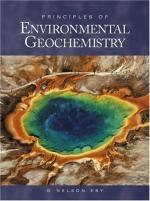|
This section contains 989 words (approx. 4 pages at 300 words per page) |

|
Geochemistry is the study of the chemical processes that form and shape the earth.
Earth is essentially a large mass of crystalline solids that are constantly subject to physical and chemical interaction with a variety of solutions (e.g., water) and substances. These interactions allow a multitude of chemical reactions.
It is through geochemical analysis that estimates of the age of Earth are formed. Because radioactive isotopes decay at measurable and constant rates (e.g., half-life) that are proportional to the number of radioactive atoms remaining in the sample, analysis of rocks and minerals can also provide reasonably accurate determinations of the age of the formations in which they are found. The best measurements obtained via radiometric dating (based on the principles of nuclear reactions) estimate the age of Earth to be four and one half billion years old.
Dating techniques combined with spectroscopic analysis provide clues to...
|
This section contains 989 words (approx. 4 pages at 300 words per page) |

|


